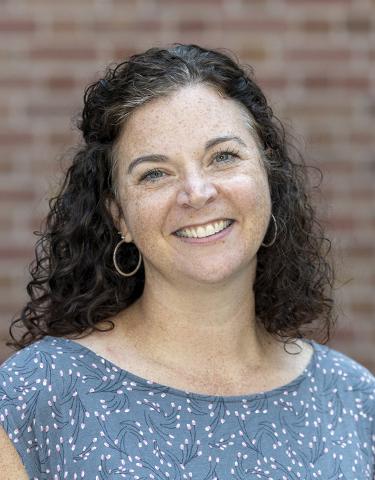Education
- B.S., University of Kentucky - Agricultural Biotechnology
- Ph.D., University of Wisconsin-Madison - Plant Breeding and Plant Genetics
- Postdoctoral Fellowship, Carnegie Institution for Science - Department of Plant Biology
Background
I grew up in the small town of Danville, Indiana, with my wonderful parents and spent lots of time outside with my two brothers. Following high school, where I first became interested in biology and genetics, I attended the University of Kentucky for my undergraduate education where I started working in a plant genetics lab. After graduation, I decided to continue my education and pursued a Ph.D. in Plant Breeding and Plant Genetics at the University of Wisconsin - Madison, working on genetic and cellular processes in the plant model system, Arabidopsis thaliana. Following Madison, my husband and I spent four years in the San Francisco Bay Area where I was a post-doctoral researcher at the Carnegie Institution for Science. There I began my foray into maize genetic research and we cultivated our passions for Giants Baseball (and the Brewers when they were in town), hiking, Philz coffee, and avocados. In 2011, I accepted the call to teach in the Biology Department at WLC and we made the big trek back to the Midwest. I live in Wauwatosa with my husband and daughters and we belong to St. John’s Evangelical Church in Tosa, where our kids also attend school. As a family, we especially enjoy the summers when we can walk to the nearby Farmer’s Market, listen to summer concerts in the park, and go on vacations that always bring us to some kind of beach and hiking. Not to mention the summers allow me lots of time to grow corn and work with students in my research lab.
Teaching
Current Courses
- BIO 124 Plant Science
- BIO 202 Principles of Biology 2
- BIO 324 Botany
- BIO 401/402/403 Research Strategies
- COL 101 Introduction to College Experiences
Other Past Courses
- BIO 120 Life Science
- BIO 433 Molecular Biology
Research Interests
I am interested in exploring how seeds develop and I use maize as a model system. The goals of my research are to determine genes and factors that influence seed development and to specifically determine the contribution of the maternal parent to this process. My research integrates techniques in genetics, molecular biology, cell biology, and plant physiology to answer this central question.
I am also interested in working with undergraduates to develop curriculum materials to share Biology and Plant Science with younger students and the wider community. It is an awesome way to integrate science research, teaching, and civic engagement and share the wonder and beauty of plant science with others.
Scholarly Works
Select Presentations and Publications
Vischulis, E., M. Wendt, W. Swarztrauber, K. Hilgendorf, J. Brandt, J. Bechtel, H. Fleming, J. Anderson, A.M. Chettoor, M.M.S. Evans, and A.R. Phillips. (2021) “Analysis of stunter2 and stunter3, Maize Maternal Effect Mutants with Reduced Kernel Size.” Poster Presentations at The Annual Maize Genetic Conference and The Annual Meeting of the American Society of Plant Biologists
Phillips, A.R. and M.M.S. Evans. “Maternal Regulation of Seed Growth and Patterning in Flowering Plants.” Ed. Florence L. Marlow. Current Topics in Developmental Biology, Academic Press, 140, 2020: pp 257-282.
Chettoor, A.M., A.R. Phillips, C.T. Coker, B.D. Dilkes, and M.M.S. Evans. (2016). Maternal gametophyte effects on seed development in maize. Accepted for publication, Genetics.
Phillips, A.R. and M.M.S. Evans. (2011). Analysis of stunter1, a maize mutant with reduced gametophyte size and maternal effects on seed development. Genetics187(4): 1085-1097.
Phillips, A.R., A. Suttangkakul and R.D. Vierstra. (2008). The ATG12 conjugating enzyme, ATG10, is essential for autophagic vesicle formation in Arabidopsis thaliana. Genetics 178(3): 1339-1353. Phillips, A.R., A.L. Roberston, J. Batzli, M. Harris, and S. Miller. (2008). Aligning goals, assessments and activities: an approach to teaching PCR and gel electrophoresis. CBE Life Sci. Educ. 2008: 96–106.
Robertson, A.L. and A.R. Phillips. (2008). Integrating PCR theory and bioinformatics into a research-oriented primer design exercise. CBE Life Sci. Educ. 2008: 89–95.
Thompson, A.R., J.H. Doelling, A. Suttangkakul, and R.D. Vierstra. (2005). Autophagic nutrient recycling in Arabidopsis thaliana directed by the ATG8 and ATG12 conjugation pathways. Plant Physiol. 138(4): 2097-2110.
Thompson, A.R. and R.D. Vierstra. (2005). Autophagic recycling: lessons from yeast help define the process in plants. Curr. Opin. Plant Biol. 8(2).
Service
- School Chair of the School of Natural Sciences
- Department Head of the Department of Biology
- Faculty Committees – General Education Committee, Persistence Committee, Institutional Biosafety Committee
- Teaching Plant Biology topics to K4 and K5 students at St. John’s Evangelical Lutheran School
Professional Memberships
- Member of the American Society for Plant Biologists
- Member of the Maize Genetics Cooperation


 Biology
Student Success Center
Dean of Student Success/Professor of Biology
Biology
Student Success Center
Dean of Student Success/Professor of Biology